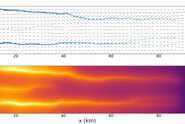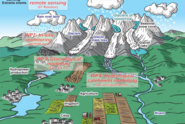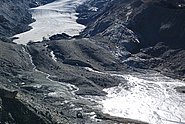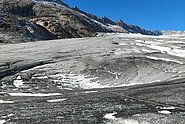
Glaciology ¶
Contents ¶
¶
Most glaciers in the world are shrinking due to climate warming. Knowing how they evolve is crucial for projecting long-term water availability, planning hydroelectric infrastructure, and assessing natural hazards. We investigate glaciological processes in computer models, laboratory experiments, and field work. Our work is performed in collaboration with the Laboratory of Hydraulics, Hydrology and Glaciology (ETH Zürich), to which we are jointly affilated.
Glacier retreat is one of the most prominent and visible consequences of ongoing climatic change. The resulting changes do not only alter our landscape, but are also linked to a series of implications such as water shortages, and natural hazards such as glacier lake outburst floods.
Our group is committed to deliver answers to pressing glaciological questions with local- to global-scale relevance, and does so by combining numerical modelling with observations gathered from both remote sensing and field-based activities.
In laboratory tests we contribute to a better understanding of fundamental processes controlling glacier hydrology and glacier motion. In field experiments, we study glacier accumulation and melt, glacier flow, and glacial erosion. We use these information and data to inform numerical computer models by which we reconstruct past glacier extents and predict their future evolution, including related consequences.
We do not only target negative aspects of glacier shrinkage but also aim at exploring new possibilities, such as the hydropower potential within formerly glacierized areas, for instance. We also analyse how improved meteorological forecasts can increase the short- and long-term glacier evolution, ultimately aiming at increasing the predictability of future water resources from high-alpine environments.
Glacier research in pictures ¶








Projects ¶
Multimedia ¶
How much longer will Switzerland remain the water castle of Europe? (german only) ¶
At WSL we are researching the upcoming changes in the snow and ice balance, and how we can protect ourselves from too much and too little of it. Video project of the Swiss Federal Institute for Forest, Snow and Landscape Research WSL under the direction of Gottardo Pestalozzi, realised by VJii Productions and presented by Daniel Farinotti.
Melt ¶
ESA astronaut Luca Parmitano together with Prof. Daniel Farinotti, other glaciologists and climate experts on their journey across the Alps to learn how rising global temperatures are stressing the glaciers.
Climate change: "It doesn't look good for our glaciers." ¶
On this hike, glaciologists Prof. Daniel Farinotti, Loris Compagno and Jane Walden from ETH Zurich and the Swiss Federal Research Institute WSL reflect on the effects of this development - for example on water resources, natural hazards, energy production or even tourism. And they agree: we should think about what future we want. Ideally now.
Melting power ¶
This short film was made by Saskia Gindraux and Sonia Meller, two PhD students at the Swiss federal institute for forest, snow and landscape research WSL, as they participated in the Filmmaking Marathon 2017
Gletscher erforschen mit einer Drohne ¶
As part of her doctoral project, glaciologist Saskia Gindraux is studying three glaciers in Switzerland. She is creating 3D models of the glacier volume by georeferencing aerial photographs.
Links ¶
- Our group's webpage at VAW - ETH Zurich
- Open BSc and MSc theses
- GLAMOS: Glacier monitoring Switzerland
- PERMOS: Swiss Permafrost Monitoring Network
Staff ¶
Glaciology
Group leader / Joint Professorship |
|
Visiting scientist |
|
PhD student guest |
|
PhD student guest |
|
Visiting scientist |
|
Scientific staff member |
|
Visiting scientist |
|
Temporary employee |
|
Visiting scientist |
|
Scientific staff member |
|
Visiting scientist |
|
Visiting scientist |
|
Visiting scientist |
|
Visiting scientist |
|
Visiting scientist |
|
Visiting scientist |
|
Visiting scientist |
|
Visiting scientist |
|
Visiting scientist |
|
Visiting scientist |
|
PhD student guest |
|
Visiting scientist |
|
PhD student |
|
Scientific staff member |






